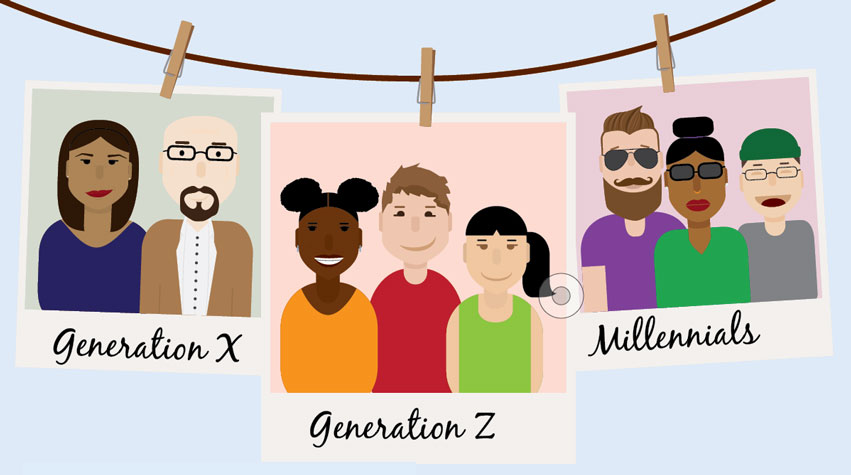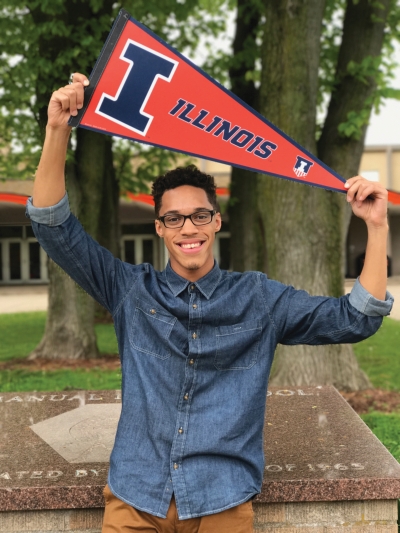
Our nation’s largest cohort is under 22 and up to their necks in generalizations. Should we be painting with such a broad stroke?
I remember sitting in a bar with close friends after college graduation in May of 2013. As I posted pictures of my beer flight to Facebook, a friend pulled an issue of Time magazine from her bag. On its cover: “The Me Me Me Generation: Millennials are lazy, entitled narcissists who still live with their parents.”
It felt like a punch in the gut to my friends and me that day. The article started with data about narcissism, oversharing and prolonged adolescence, then applauds Millennials for challenging convention, before ending with a meandering list of pros, cons, life-altering world events and technological shifts—all to say that Millennials, like every generation before, are complex.
Speculating about the generations feels like guessing whether it might rain eight days from now. It’s acceptable small talk, and there’s a whole lot of contradictory data. But just as we still look to the weather forecast, we should be prepared for what we’ll read or not read, and believe or not believe about “Generation Z,” the cohort of our compatriots born roughly between 1995 and 2012.
This group has not yet received its endearing pop-culture nickname, though iGen, Centennials and Plurals are all in the running. They are said to be self-aware, easily distracted and private, having a more developed sense of social media restraint than Millennials. Factually, Gen Z is the most diverse generation the U.S. has ever seen. The Census Bureau tells us that between 2000 and 2010, the country’s Hispanic population grew at four times the rate of the total population, while people identifying as biracial rose 134 percent.
To get to the bottom of how this hugely diverse group—which makes up the biggest slice of our nation’s population—thinks and behaves, I interviewed three local high schoolers. That should do it, right?
The Curse of Gen Z
When I tell each student that research shows they have the shortest attention spans ever measured, they all agree emphatically before I even ask a question. While they may self-identify as easily distracted, it’s worth noting that I had engaging conversations with each of them for an hour or more, never losing focus of the topic at hand.

Dakota Richmond
Lia Lohnes, a sophomore at Peoria Notre Dame, immediately relates her peers’ distractedness to technology. “Everything is progressing really fast. There are always new updates on everything, and there’s no reason for that to stop.” Dakota Richmond, a recent graduate of Pekin Community High School, shares that sentiment, saying her peers are used to having whatever they need at the touch of a finger. These reflections are in line with what experts tell us about technology affecting attention spans, but it isn’t all bad.
“My short attention span is because I’m getting ideas left and right,” Richmond tells me. “It helps me process.” She also laughs about her speech coach, who will read the team an article aloud while in the meantime, Richmond is able to summarize it… and find five more. Having always been bombarded with information, these students are able to rapidly filter out the unnecessary.
It’s this climate of ever-changing technology and short attention spans that led Alex Sierra, who graduated from Manual Academy this year, to observe that “educators have to find creative ways to give individual attention.” Richmond, too, says there are “barely any lecture classes anymore. Everything is discussion and handouts,” and that she and her peers “aren’t going to pay attention if you just lecture at [them].”
These students have only heard the bad stuff about Gen Z: lazy, narcissistic, short attention spans. But research proves people begin to believe what they are told about themselves, so let’s flip the script. These young adults gave me every reason to believe Gen Z is quick to adapt and ready to be engaged.
Social Spectrums
One way lines are drawn between generations is through world events. It’s said that Baby Boomers were shaped by the JFK assassination, while the fall of the Berlin Wall was momentous for Gen Xers. Millennials and Gen Z are often divided by those who remember 9/11 and those who don’t. A consensus among the students interviewed was that those old enough to remember that day share a defensiveness that Gen Z is ready to do away with.
“Security is the main thing that defines Gen Z,” says Sierra, in that they don’t care about it. He feels those who remember 9/11 have been on defense ever since, whereas his generation is more open to differences. Richmond attributes this trait to the ability to easily access information, images and ideas from around the world. “Don’t let physical differences stop you from making an initial connection, and you can be friends with almost anyone,” she says.
Sierra expresses a desire to progress beyond this time of hyper-sensitivity to race and ethnicity. Identifying across racial and ethnic spectrums himself, he has always been lighthearted about such differences. “I will crack a joke about race in a heartbeat,” he says. “I see everyone as equals.” But then he backtracks, and says that was before the 2016 election. Sierra says color has been taken much more seriously since then, and recent events have caused him and his peers to consider the degree to which racism still exists.

Lia Lohnes
Lohnes speaks specifically about the LGBTQ+ movement, saying, “I saw my friend come out as gay, then later trans, and I saw all these people supporting that on social media.” Having more access to others’ opinions led her to understand that it was okay to diverge from the patterns she saw growing up, and in turn, discover new ways to love and accept others.
All three students believe that social media, in some way, has pushed their generation to be more tolerant. But more interesting is what Gen Zers are willing to share about themselves.
Lohnes and Richmond both talk of Finstas, short for “fake instagrams.” Finstas are typically private accounts where content is shared much more freely. Richmond says they are often used by athletes or others with a social status to uphold. It might be made up of content that could get them in trouble, or be harmless but excessive, like a group message between best friends.

Alex Sierra
Sierra says Finstas aren’t as popular at Manual. Kids on his side of town, he says, don’t have quite as much access to social media—they don’t all have laptops out during school and use a larger variety of phones, which can distort images and messaging. Sierra believes it’s having less access to social media that makes his peers so quick to post anything when they are able to use it. “That’s why robberies and murders are getting solved so quickly,” he says, “because people will post anything.”
If socioeconomic and location-based factors can lead kids to different social media privacy practices, then there seems to be a problem with painting Gen Zers with broad strokes like “digital natives” and “cautious social media users,” as has so often been done. This conversation is what brought me back to my original thought: it is impossible to predict the behavior of a group of people just because they are the same age.
Blurring the Lines
I was hoping that interviewing high schoolers would validate my opinion that generational labels are just one more way to divide us. Instead, they had some pretty good reasons why this kind of label might bring us together. Sierra sees Gen Z as a label based on shared experiences that could prevent further categorization into religious or ethnic spheres. People like to put others into boxes. Maybe categorizing by generations is one way to make those boxes a little bigger. “Of course we are going to have certain things we are all alike in, until you get really specific, then it gets ridiculous,” Richmond summarizes. Thinking back to the myriad articles I read as a Millennial entering the workforce, I agree with her.
Shortly after Time’s cover story, Forbes published “Open Office Back in Vogue -- Thanks to Millennials.” Only a year later, the magazine was forced to renege with an article titled “Why Your Open Office Workspace Doesn’t Work.” It’s because Millennials, too, don’t want to hear coworkers make phone calls or have to wear sound-canceling headphones for a moment of peace. Companies got it wrong when they assumed Millennials’ connectivity would make private workspaces obsolete. Trusting Gen Z’s ingenuity to help create an attractive work environment may be wiser and more likely to spur real progress than jumping to conclusions to lure them in.
Gen Z, like Millennials before them and Gen Xers before that, will be able to adapt to the culture of the organizations and societies they enter—but they’re also going to leave their mark. Leaders don’t need to drastically change their business structure or expectations as Gen Z enters the workforce, but they should be ready to engage and adapt. After all, if Gen Z is confident in anything, it is their ability to do just that. a&s
- Log in to post comments

